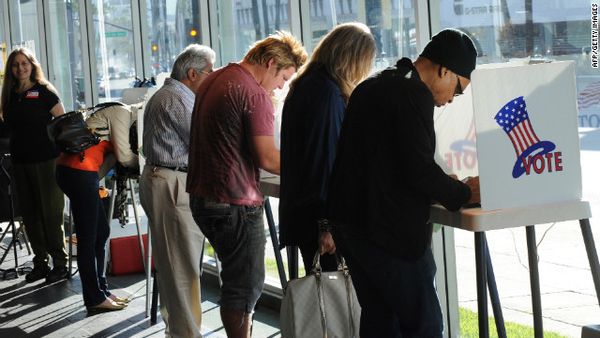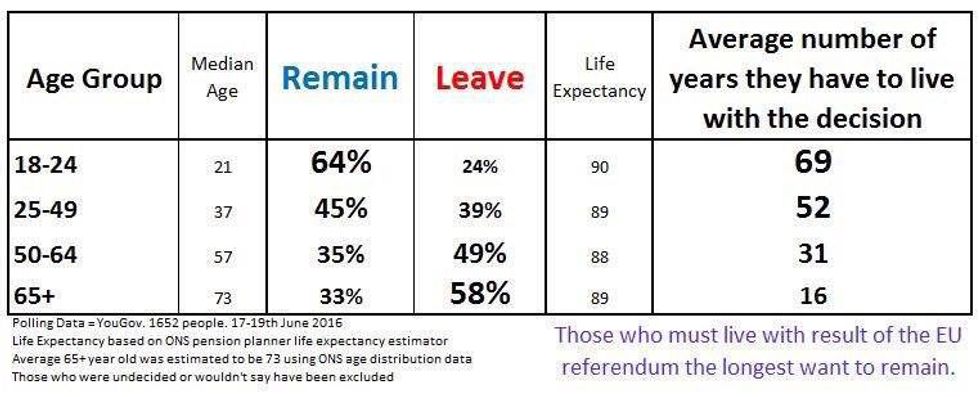I proposed this idea in my political science class and received a barrage of laughter and criticism for it, but I stand true to my belief that it is against the will of the constitution to restrict 16 and 17-year-olds from voting. “I don’t trust the judgement of 16-year-olds to make these kind of big decisions” said one of my classmates. Another said, “16 year-olds aren’t educated enough to vote yet.” I’d like to explain the fallacies of these arguments and why, both theoretically and practically, 16 year-olds should be allowed to vote.
When my classmates and many other people voice their opposition it usually has to do with their idea of a 16-year-old and idea of an adult voter. Their logic is that a 16-year-old will always not know enough to vote whereas an adult always will. However, these generalizations do not logically hold up. What makes a high school junior who is class president, an honor student, editor of the newspaper and a congressional intern less qualified than a 25-year-old who dropped out of school in 9th grade? Not satisfied with that radical example? Fine. What makes a 16-year-old who dropped out of school in 9th grade any less qualified than a 25-year-old who dropped out of school in 9th grade? The answer, or at least my answer, is nothing. The 16-year-old dropout probably isn’t engaged with civics, but the same likely goes for the 25-year-old dropout as well. “Well people who don’t know much about who to vote for or aren’t interested in politics probably don’t frequently vote anyways. It's usually just the educated adults, right?” Wrong.
According to a Pew Research Poll, 44% of voters admit they “know little about the candidates.” For intermittent voters that number jumps to 60% and for registered but occasional voters it’s a staggering 76%. Average that all together and you get 60%. So three in five registered voters and nearly half of frequent voters feel they don’t know enough to make informed voting decisions. So my question for you is, with voters this uninformed, can you really argue that 16 and 17-year-olds, many of whom are currently in the midst of US History, US Government and Civics classes, would be so much less informed?
Now you may argue, “Well Drew, you’re just a college freshman, who are you to say the founding fathers were wrong? The founding fathers made the voting age 18 for a reason. It was because they knew that people gained the maturity to vote at 18.” I didn’t create this question from nowhere, many people tell me they believe that it was the founding fathers who made the voting age 18 and that’s why it should stay the same. Well, fun fact, until the 26th Amendment was ratified in 1971, the voting age was 21. Does that number sound familiar? It should, because it’s the same as the drinking age: a limit which college-age-people love to rail on for being out of date and not reflecting the true age of maturity. Well they are right to rail, because this notion of maturity at 21 comes from hundreds of years ago. It originates from British common law and is, in essence, completely arbitrary based on modern standards. Even our current voting age of 18 is arbitrary because it has nothing to do with maturity, it had to do with the draft. In the 70s any male at 18, regardless of maturity, could be drafted. The national voting age was only changed to 18 after the Vietnam war because America’s youth at the time said “If we’re old enough to die for our country then we’re old enough to vote” This is the same argument that 18-year-olds use when they want the drinking age lowered. Let’s face it, if voting was as pleasurable as drinking, 16 and 17-year-olds would be up in arms about their rights being infringed based on arbitrary standards of maturity.
So what would be the actual consequences of letting 16 and 17-year-olds vote? Well for one thing, it would help bolster the ranks of progressive voters: voters who represent the current trends and who typically vote in favor of bettering the future. If you take a look at a previous article of mine, you’ll find a plethora of citations and statistics on the issues that millennials care about, and members of generation z feel similar.
A good example of the effect of the youth vote, or in this case the lack thereof, is Brexit. In June 2016, the United Kingdom came voted to make the chaotic decision to leave the EU. It has been branded by world leaders, as well as top economists, as a huge mistake. Who made this mistake? Well, turnout for people 25-39 was 65% while turnout for those over 65 was a whopping 90%! Older voters had an overwhelmingly heavy say in this decision that will likely have consequences that could last for decades or even centuries (The chart below helps to reveal some of the hypocrisy of this). In fact, even though youth turnout was so low, according to Michael Bruter, professor of political science and European politics at the LSE, “if 16- and 17-year-olds had been allowed to vote, the result would almost certainly have been closer.” So there you have it, a very example of how a lower voting age in Britain might have actually helped save them from the gloom and doom that is forecasted for their future.
When there is a big turnout, better elections occur. High turnout in 2008 resulted in the election of Barack Obama as well as the strengthening of a progressive congressional supermajority which was instrumental in passing key legislation such as the Affordable Care Act and the Dodd-Frank Wall Street Reform Act. Then, in 2010 and 2014 low voter turnout helped flip that progressive majority and make some of the most unproductive and most obstructionist congresses in modern US history. How will lowering the voting age prevent these low turnouts? Well, according The Center for Information & Research on Civic Learning and Engagement, voting is a habit, and the earlier teens learn to vote, the more often they will do it as they get older. This means that if we encouraged high schoolers to vote, we could significantly increase youth voter turnout which was a staggeringly low 19.9% in 2014.
People really should not be strongly opposed to this for their sakes. Whether you like it or not, the fight for the youth vote is a fight for suffrage. This is a group of people that is subject to laws, and sometimes taxation, without representation. So if you are against youth suffrage, then congratulations because you’re not alone. Millions throughout history have joined in the opinion that people whose demographics aren’t ‘well suited’ to vote shouldn’t be given the right to do so. You are joined by anti-abolitionists (Pro-slavery people), anti-suffragists (People who didn’t want to give women the right to vote) and racists! In the south during the 19th and early-mid 20th century, the south imposed literacy tests that systematically restricted black voters due to their typically lower levels of education and civic information than whites. Maybe you think that most 16-year-olds you know don’t even want the right to vote? Well that argument was championed by anti-suffragists in the 1910s to stop women from getting the right to vote. Fighting against youth suffrage is so analogous to fighting against women and racial suffrage that if you became an activist against the cause, history might end up frowning upon you as it now does anti-suffragists and anti-abolitionists.
One good question to ask, and one that I wouldn’t pick apart like all the others, would be “Well why should I care? Plus, you’re 18 and can vote! Why do YOU care so much?” My answer is simple; I care because this country is headed for a cliff, and it’s largely because of older generations, whiter, less diverse and less representative of this country, who think that America needs to look like what it did in the 60s. They want us to go back to a time where you could call women “broads,” where sexual assault was just having a good time, and you could call a black man the N word but you weren’t a racist, you were mainstream. As our society becomes more advanced, our youth is becoming proportionally more educated than before. Many students in 10th grade are probably learning what college students were learning just two generations ago. They also become more diverse and socially progressive.
If this article has somehow managed to pique your interest, then take a look here to get involved with the movement to lower the voting age. It is time to start letting more people make these big, important decisions that will impact their futures. It is time to lower the voting age.





















